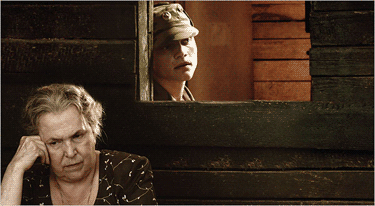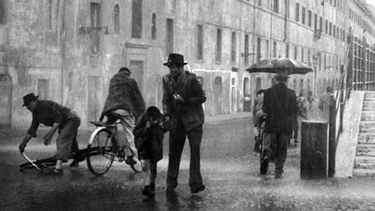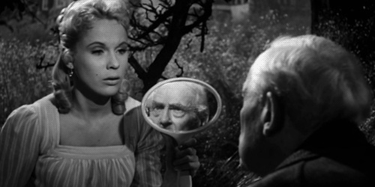Lucidno
Old Age and Film
"That is no country for old men. The young
In one another's arms, birds in the trees
- Those dying generations"
WB Yeats, Sailing To Byzantium
 "An elderly woman visits her young Russian soldier grandson in an army camp inside Chechnya." This one sentence sums up the whole plot of Alexander Sokurov's masterful work, Alexandra (2007). But how much depth and subtlety Sokurov creates out of these few words! The situation of a Russian soldier in Chechnya is already enough to conjure up a tragedy. In addition, there is the relationship between grandmother and grandson, following on from Sokurov's tender explorations of the ties between Mother and Son (1997) and Father and Son(2003). The grandmother is played magisterially by 82-year-old Galina Vishnevskaya, already the subject of Sokurov's documentary Elegy of Life (2006), which was dominated by her expressive face. In Alexandra, Sokurov presents us with the beauty of old age without any sentimentality, extremely rare in the cinema where the old, if visible at all, are treated as either very wise or very stupid, lovably twinkly-eyed, eccentric or grotesque. Vishnevskaya is none of these. She plays a determined, level-headed old woman, who seeks no special pleading. Unlike Micheal Haneke's Amour, which associates old age with decrepitude and death, but which has brought into focus how the elderly are treated in the cinema. In the other arts, there are blazing examples of the representation of old age, one of the most powerful being Michelangelo's patriarchal Moses in the church of San Pietro in Vincoli in Rome, glaring defiantly at the tourists who gather around him. Shakespeare, born in the year of Michelangelo's death, gave us King Lear - "You see me here, you gods, a poor old man, as full of grief as age; wretched in both!".
In painting, images of the aged were common in the seventeenth century, notably in Rembrandt's moving portraits of old men and women, including himself, in which the wrinkles and other signs of age are not minimised but carefully recorded, so that the face moves us as the locus of emotion, character and temperament. In 20th century poetry, TS Eliot ("Here I am an old man in a dry month") and WB Yeats ("An aged man is but a paltry thing, a tattered coat upon a stick") were captivated by the sixth age, in Shakespeare's terms, while Samuel Beckett, above all artists, was willing to penetrate the "last scene of all" of "second childishness and mere oblivion, sans teeth, sans eyes, sans taste, sans everything".
{niftybox background=#8FBC8F, width=360px} The history of film has fewer great examples. Is it because producers are conscious that cinema audiences, whose average biological age is around 24, are more interested in the Twilight trilogy than the twilight years? Is it because old people are "not sexy"? This disregard or distorted regard by the cinema is a symptom of society's indifference to old people. {/niftybox} |
Nevertheless, old age has been the subject of several classic films against which Amour suffers in comparison. The Last Laugh (1924) told of a doorman at a luxury hotel, proud of his work and uniform, who is removed from his post because of old age and reduced to being a lavatory attendant. The film that made F.W. Murnau's international reputation was centred on the imposing physical presence and expressive performance of Emil Jannings.
Leo McCarey's Make Way for Tomorrow (1937), the only major Hollywood film about the aged, opens with the simple Biblical commandment: "Honor thy father and thy mother", and goes on to show how this is disobeyed. An elderly couple (Victor Moore, Beulah Bondi) are forced to separate when they lose their house and none of their five children will take both parents in. McCarey's remarkable film, not a success at the time, was an influence on Tokyo Story (1953). In Yasujiro Ozu's masterpiece, an elderly couple (Chishu Ryu, Chieko Higashiyama) pay a visit to their children and grandchildren in Tokyo, but they are made to feel a burden on them. This radiant, gentle, heartbreaking and perceptive investigation into the tensions within a family, old age and the generation gap, was released in the USA in 1972, almost 20 years after it was made. In Umberto D (1952), an old age pensioner, unable to pay his rent is forced to consider begging and suicide. Dedicated to his father, the film, which marked the end of Vittorio De Sica's Neo-Realist period, is one of the director's most affecting films, avoiding easy sympathy. It failed miserably at the box office because a story of old age, loneliness, spiritual and material poverty did not appeal to audiences of 1952 who were eager to embrace the promised "economic miracle". The Ballad of Narayama (directed by Keisuke Kinoshita in 1958, and Shohei Imamura in 1983) took the theme to its logical conclusion. The allegorical tale describes the custom, in a remote village in North Japan, that requires the elderly, on reaching the age of 70, to be abandoned on a mountain top. Akira Kurosawa's Ikiru (1952) pictured a sterile society in which an elderly civil servant (Takashi Shimura), discovering he is in the terminal stages of cancer, spends his last months attempting to find a purpose in life. Old age was also looked at unflinchingly by Kurosawa in Ran (1985), his lavish version of King Lear, and Rhapsody in August (1991), in which an 86-year-old grandmother remembers the bombing of Nagasaki, which caused the death of her husband and other members of her family. {niftybox background=#8FBC8F, width=360px}It might be a good idea for some national cinematheque to hold a season of senior citizen films, including Vsevolod Pudovkin's Mother (1926), Kenji Mizoguchi's Sansho Dayu (1954), John Ford's The Last Hurrah (1958) and Lindsay Anderson's The Whales of August (1987). However, despite the critical success of Amour, I'm not sure there are enough gerontophile film-goers to support it.{/niftybox} Wild Strawberries (1957), Ingmar Bergman's smiles and tears of a summer's day, is a mellow modern morality with the extraordinary farewell performance of 78-year-old Victor Sjostrom, Bergman's predecessor as the greatest Swedish film director. More recently, old people were the focus of Theo Angelopoulos's Voyage to Cythera (1984) in which an old man returns to Greece after more than 30 years exile in the Soviet Union and attempts to come to terms with his country and a family he hardly knows. Jean-Luc Godard's visual poem, Eloge de l'amour (2001), has an old couple whose true-life story of love and heroism during the Nazi Occupation is being bought by a Hollywood studio. In Manoel de Oliveira's I Want To Go Home (2001), Michel Piccoli struck a poignant note as an actor trying to deal with old age, and refusing to compromise his principles, and in Belle Toujours (2006) he revisits a role he played nearly 40 years earlier in Belle de Jour. Most Hollywood stars have been reluctant to accept old age, some exceptions being Henry Fonda and Katharine Hepburn in On Golden Pond (1981) and Paul Newman and Joanne Woodward in James Ivory's Mr and Mrs Bridge (1990). The only American actor to consistently portray old men, warts and all, was Orson Welles. In his own films, Charles Foster Kane, Gregory Arkadin, Hank Quinlan, Falstaff ("I know thee not old man") and Charles Clay (The Immortal Story) are all giants brought down by hubris. Ronald Bergan |
____________
1




